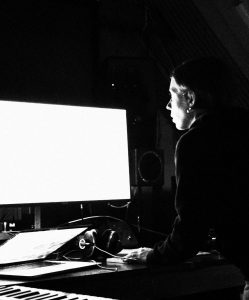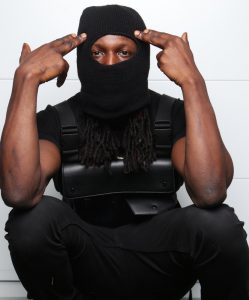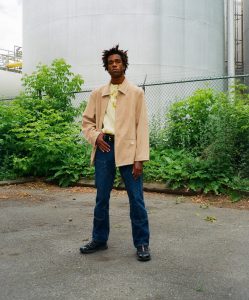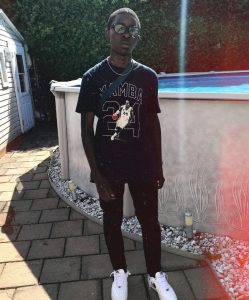As a complement to our annual review of five “Queb” rap rookies to watch, here’s a portrait of five beat-makers who’ll break through on Québec’s hip-hop and electronic scene in 2022.
Gene Tellem
 Raised to the sounds of ‘90s British trip-hop and Daniel Bélanger’s downtempo explorations on Rêver Mieux, Gene Tellem was attracted to the piano at a very young age, before switching her attention to the guitar in Cégep.
Raised to the sounds of ‘90s British trip-hop and Daniel Bélanger’s downtempo explorations on Rêver Mieux, Gene Tellem was attracted to the piano at a very young age, before switching her attention to the guitar in Cégep.
“I studied jazz guitar [at Saint-Laurent cégep], and around that time I started going out, and discovered after-hours clubs. That’s where I was introduced to electronic music,” says the now 30-year-old, Montréal-based beat-maker. “I started tinkering with machines, buying vinyl records, and mixing. I also grew interested in producing music. I bought Ableton Live [software], and all through my twenties I experimented with it a lot. Took quite a while before I produced something decent.”
It was in 2017 that Tellem unveiled herself with a first physical release, the EP Who Says No, on Montréal’s dance label Sounds of Beaubien Ouest – a subsidiary of the iconic Arbutus Records, which gave us Braids, Grimes, Blue Hawaii, and several other prominent local artists. Inspired by the New York house music scene, where she’s been an assiduous visitor for the past five years, the Bienvenue Recordings founder has since released seven other projects – some on vinyl, some on digital formats, most of which are available on listening platforms.
Mainly intended for the dancefloor, Tellem’s music took a whole new turn last year on Speed of Life, the second EP by singer Laroie, a longtime friend. Yanked out of her comfort zone, the result was an ethereal amalgamation of trip-hop, R&B, and electro-pop. “I was intimidated,” she readily admits. “Pop is my kryptonite when it comes to composing. I saw it as a challenge. Now I really enjoy [making that genre of music].”
In 2022, the musician will strike again with her friend for two new releases: Laroie’s latest project, and another one, with Secret Witness, a house band where the two play alongside drummer Pascal Deaudelin and producer Gabriel Rei. Tellem is also working on a duet project with Rei (Game Plan), as well as an upcoming solo EP in conjunction with New York’s Second Hand Records and, possibly, a full-length debut album on her own label. “I’m totally immersed in composing right now,” she says. “I’m gravitating towards songwriting and a listening experience, and away from typical club beats.”
Melowithdaheat
 Melowithdaheat first became known on Montréal’s hip-hop scene under the moniker Melomayne. In retrospect, this re-appropriation of the word “mélomane” (“music lover”) has become a strong symbol for the now 33-year-old producer: it was his unwavering love of music that inspired him to carry on and never give up his passion, even though he could have justifiably done so many times.
Melowithdaheat first became known on Montréal’s hip-hop scene under the moniker Melomayne. In retrospect, this re-appropriation of the word “mélomane” (“music lover”) has become a strong symbol for the now 33-year-old producer: it was his unwavering love of music that inspired him to carry on and never give up his passion, even though he could have justifiably done so many times.
Born in Little Burgundy, Montréal’s South-central neighbourhood, the Québécois-Congolese artist began making beats in the mid-aughts, inspired by the producer Vader (his cousin), who’d just purchased FL Studio (a music-creation software). “I made my first beat in a couple of days and thought it was amazing,” says Melowithdaheat. “I sent it to my cousins and they laughed at me really hard. Of course my beat sucked! I just didn’t care. I was already obsessed.”
Alongside Vader, the young producer created the group NOGAMZ and quickly ensured his success in the increasingly democratized – and competitive – beat-making market. Their first major placements arrived in 2012, notably with Booba and Sefyu, and the two cousins got their first contract in France. “It was a magical year,” says Melowithdaheat, wistfully recalling many paid trips and clothing sponsorships. “Sadly, for reasons unknown to us, [the rapper they were making beats for] stopped making music. We managed to get out of the contract, but it was like starting from scratch.”
And that was just the beginning of their hardships. In the years that followed, they had to contend with a crooked manager, and signing an American deal that turned out to be a dead end. “The music industry grossed me out a bit,” says Melowithdaheat. “I stopped making placements, but my passion came out unscathed.”
More recently, finding out his mother was ill triggered him to start making music professionally again. “It made me think a lot,” he says. “Then, in 2020, just as the pandemic started, I decided to go all in. I quit my job, I started investing in the stock market with my severance pay, and three months later, I learned how to record people. Six months later, I opened my own studio.”
Thanks to a few placements with key artists on the Québec scene (Rosalvo, OneNessa, SB, and LK tha Goon) as well as with the renowned French rapper Kalash, Melowithdaheat kickstarted 2022 with ironclad determination. In addition to preparing the launch of two new Montréal-based rap hopefuls (Bagfull and Kyilah), he is working on several secret collaborations he can’t announce just yet.
Nkusi
 Of Rwandan origin, the Trifluvian (a name that denotes people living in Trois-Rivières, Québec) beat-maker Nkusi was baptized with music early on in life, when his mom enrolled him in the church choir. A few years later, he traded praising the Lord for a more popular form of expression among the youth of his adopted city: rap.
Of Rwandan origin, the Trifluvian (a name that denotes people living in Trois-Rivières, Québec) beat-maker Nkusi was baptized with music early on in life, when his mom enrolled him in the church choir. A few years later, he traded praising the Lord for a more popular form of expression among the youth of his adopted city: rap.
First established by trailblazers such as Ale Dee and Sir Pathétik, the Trois-Rivières hip-hop scene has been alive and kicking for about a decade now. Thanks to its vitality and dynamism, Nkusi was introduced to beat-making a little more than five years ago. “Even though [Sir Path and Ale Dee] aren’t always taken seriously, they’ve put Trois-Rivières on the map in many people’s consciousness,” says Nkusi. “There’s something brewing over there.”
But make no mistake about it: the 28-year-old producer has nothing in common with the smooth pop tunes and dated piano-violin flights of the two veterans. On the contrary, his is a minimalist hip-hop groove, with soul and electronica flavours, that he inherited from his love of Flying Lotus, Flume, Kaytranada, and Knxwledge.
Jimmy Young, a central player on the Trifluvian scene, was the one who turned him on to beat-making. While in Québec City to study jewelry-making, Nkusi decided to forge on with his first project, Gutaginza (2019). “That’s where I understood how to flesh out my ideas and monetize my art, and I had a job at Le Bureau de poste [a popular bar in downtown Québec City],” he says. “I worked in the kitchen, but one day they asked me to DJ. When I got my first cheque for doing that, I couldn’t believe how lucky I was. That was the initial spark.”
The spark turned into a flame when he moved to Montréal in early 2020. His alliance with producer Funkywhat (another of Montréal’s emerging beat-makers) on the mini-album Fwnk, as well as his considerable participation in the first EP of indie pop singer Thaïs (now signed to Bravo Musique), allowed him to diversify his sound. “The producers I admire aren’t pigeonholed. And that’s what I’ve always aspired to. I love music above all else. I have no intention of limiting myself,” says the man who also specializes in sound design for podcasts, and in the development of artistic projects of social entrepreneurship.
2022 will mark the release of a second solo project for Nkusi, as well as several collaborations with talented artists on Montréal’s rap and R&B underground scenes.
Beau Geste
 While studying at Cégep de Jonquière, Beau Geste started composing beats. “I met two guys who were there for their French immersion program during the summer, and both were rappers. It’s really thanks to them that I started making music,” he says, about Vancouverite JML and Torontonian Ugly Tomorrow.
While studying at Cégep de Jonquière, Beau Geste started composing beats. “I met two guys who were there for their French immersion program during the summer, and both were rappers. It’s really thanks to them that I started making music,” he says, about Vancouverite JML and Torontonian Ugly Tomorrow.
Inspired by American hip-hop trends, the beat-maker from Acton Vale slowly opened his horizons to electronic music somewhere in the mid-2010s. “I started getting into dubstep and the rave culture,” he says. “It’s people I met in Cégep, all of them from Montréal, who initiated me into that universe. And then I started making lo-fi house.”
Curiosity and open-mindedness are the main characteristics defining Beau Geste’s work. After his electronic explorations, he grew interested in the emo-rap vibe. Inspired by Lil Peep, XXXTentaction, and other (mostly) dead rappers who, ironically, gave life to the genre where the codes of trap, emo, and 2000s pop-punk meet, the now Montréal-based beat-maker unveiled his first songs in 2018. “I liked the highly melodic side [of emo rap]. I started making tons of beats with big 808’s and guitar loops,” he says.
Alongside rapper K0ne, a member of the megacollective Les Fourmis, Beau Geste released Redbird, his first major release, in early 2020. This paved the way for his most important collaboration to date, born of meeting rapper and singer Emma Beko, which crystallized on Blue, an EP with electro and pop influences.
Released in the winter of 2021, this first duet project has generated hundreds of thousands of streams on Spotify, as well as earning the title of CISM’s best English-language album of the year. “We were super-happy that it was a hit,” he says, pointing out the very DIY nature of the EP. “We did that, just the two of us, in a small room we turned into a studio. We didn’t really have any gear – just a computer and a sound card. It couldn’t be any simpler.”
The pair is preparing two more EPs to be released this year. “We’re gravitating towards something that’s closer to Emma’s hip-hop roots,” he says. “We’re totally immersed in that right now.”
A singer and guitarist, Beau Geste is also preparing the release of the first album of his new post-punk band – which, “for now,” is called Distraction 4Ever. “I’m super-inspired by the fact of playing real instruments for a project,” he says. “It’s probably going to trickle down in future releases, including those alongside Emma. I’m still in love with digital creation, though. I’m really into hyperpop and weird synth sounds lately.”
RKT BEAT
 What RKT BEAT is going through at the moment is nothing short of a fairy tale: barely 15, he’s poised to become one of the most promising hip-hop beat-makers in Québec, thanks to collabs with Shreez, JPs, and Tizzo.
What RKT BEAT is going through at the moment is nothing short of a fairy tale: barely 15, he’s poised to become one of the most promising hip-hop beat-makers in Québec, thanks to collabs with Shreez, JPs, and Tizzo.
Known for his hard-hitting signature, characterized by heavy bass and powerful drill tones, the teenager insists on one thing: he has a much wider range of influences. First raised by his parents to the sounds of rhumba, as well as Cameroonian and Haitian music, he rapidly developed a passion for dance.
Then, as is the case for most teens, he drifted away from his family’s influences in favour of the music of his time: trap. It was Metro Boomin, one of the most talented and ingenious producers of his generation, that most appealed to him in his early days. “I listened to a lot of his music and I started following his tutorials on YouTube,” says RKT BEAT. “I saw all the gear he was using. I basically wanted to be him!” he admits. “My dad got me a PC for my birthday and I downloaded FL Studio. I started from scratch, I didn’t know how to play the piano.”
Motivated by the success of his first compositions, at school and with his friends, RKT BEAT decided to go for it in 2019, contacting different rappers in the province. “I thought I was ready [for the next step],” he says. “I wrote a long message to introduce myself and sent my beats to a ton of people, including Shreez. That same night, he sent me a snippet of what he was going to do over one of my beats [what became the song Loud]. It was so random!”
When Shreez’s song was released, a few Instagram pages and hip-hop media outlets in Québec noticed the teen’s precocious talent. But even if this overnight craze gave him the confidence to believe in a career in the business, RKT BEAT makes sure to stay down-to-earth. “Music is not necessarily a career you can maintain your whole life,” he says. “I want to focus on my studies and progress towards university. I have good grades right now, and making beats is a hobby.”
Several placements are coming up in 2022, with prominent artists from the local hip-hop scene. The young man is also working on a mixtape project with various local rappers and beat-makers.